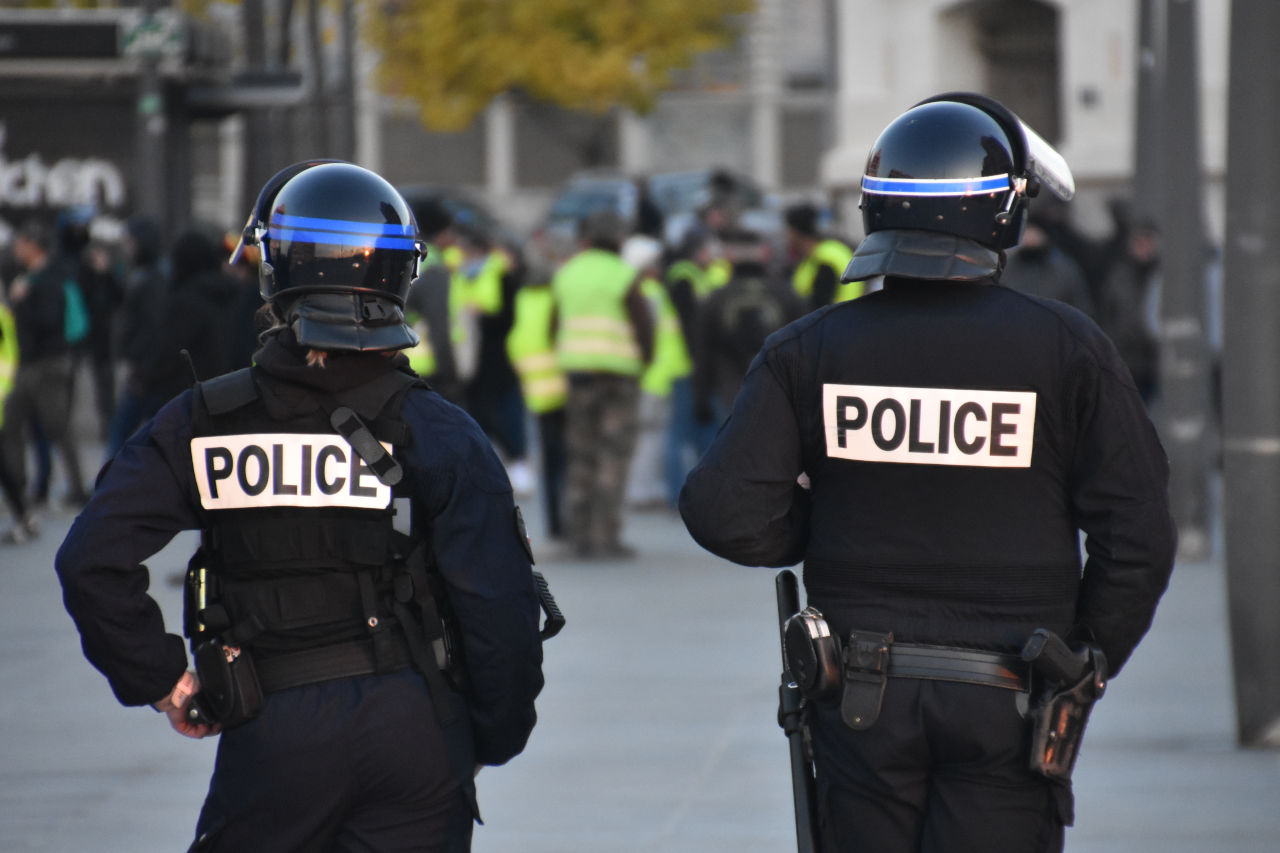The book "Flic" or how some policemen feel invested with "a divine mission".
In Flic, un journaliste a infiltré la police (published by Goutte d'Or on September 3, 2020), Valentin Gendrot describes his two years in the police force as a security assistant.
Stéphane Lemercier, University of Montpellier

In it, he recounts his three-month "low-cost" training, his assignment to a shift brigade in the 19th arrondissement of Paris, where he witnessed and even participated in several reprehensible acts perpetrated by his colleagues.
Beyond the controversy generated by the fact that he didn't intervene at the time and decided to cover up for the perpetrators by giving false testimony, without ever reporting the facts to his superiors, the fact remains that the actions reported describe a reality and attest to a "to the point" attitude that is increasingly symptomatic of certain police officers whom I would call "police-templators".
What are they? Who are they? Why is this behavior detrimental to the police, and what can be done about it?
Hunter-gatherers
In the police, "hunters" are officers who look for flagrante delicto at all costs, while "fishermen" are those who wait for a traffic offence to be committed in front of them before "catching" it.
Some of these hunters seem to believe that they have been invested with a "divine mission". Some reports mention military or religious insignia, hijacked and pinned on uniforms, valorizing their wearers and associating their profession with a symbolically powerful charge.
Some believe they are the last bastion of society, and want to crusade against delinquency and crime in the same way that the Knights Templar once set out on the roads of France to protect pilgrims and defend the Holy Land. These police officers are less concerned with their mission of public service than with eradicating all delinquents, even if it means going to illegal lengths to do so.

Joel Saget/AFP, FAL
Above all, they want to defend their territory (which is the jurisdiction of the police district) and their prerogatives (which are to maintain public order and tranquility), to impose themselves by force, if need be, by making terror reign through theperformance of rituals (systematic identity checks with very thorough palpation and degrading or humiliating remarks...) and warlike attitudes.) and warrior attitudes, because virility and violence are valued, as Valentin Gendrot repeatedly reports in his book, when bored colleagues tell him about the dangerous stops and beatings they've had to endure in the course of their careers.
They never back down: to do so would be seen as cowardice. They don't denounce themselves: to do so would be to betray their own "code of honor", which has nothing to do with the Code of Ethics...
The feeling of being the only ones with the truth
Why do they do it? Because they feel that they alone hold the truth, and they believe that what they endure on a daily basis ends up being the reality of life: street violence, social misery, drugs and death lurking on every patrol.
They also drink from media dedicated to their profession, fed with information that is often anxiety-provoking. The actu17.com website is much consulted, and also has an application and social network relays (279,000 subscribers on Facebook). Actu17 is, however, a privately-run medium, and the information it contains is not always verified. These sites also act as a safety valve for law enforcement professionals, who feel they are neither sufficiently listened to nor properly represented.
These networks, however, encourage them to remain within a certain inner circle that rarely admits outside elements. Valentin Gendrot describes this quite well when a certain Stan, the brigade's hunter, sighs because he's going to have to patrol with him, the inexperienced ADS, "the ball and chain".
They often know and recognize each other by the professional tools they wear, which tend towards a militarization of the police uniform (tactical vests, intervention gloves, modified weapons, etc.), but also in their attitude to work.
They multiply systematic controls during which they challenge the "bastards" (the young people they come across and to whom they automatically assign a delinquent role, as the author reports), they hand out slaps, utter threats, even insults, especially when they are on duty in the jails, but also on the public highway. And this goes as far as a full-scale beating if the target dares to protest after being insulted, pushed or hit.
Forming a block
This is what happened to this undercover journalist, during a routine identity check of 3 or 4 teenagers hanging around the foot of a building. One of them was slapped in front of his classmates, then taken into the police vehicle where he was punched by a police officer, before being taken into custody for contempt and threats.
The young man lodged a complaint and the police officers involved were heard. But they all rallied around their offending colleague, including those who clearly disagreed (which seemed to be the case of the patrol leader, who had made a remark to the offending officer about his way of doing things, but who didn't stop him...).
And Valentin Gendrot explains it very well: he tells us how police officers behave amongst themselves, how they withdraw into themselves, and how they communicate with each other. In fact, they close in on their professional group, with a common, identified enemy - the young immigrant or simply the "cassos" (a kind of "tough guy") who is corrupting society. They use private messaging systems, which enable them to get together and "let off steam" easily, without being contradicted.
What's more, because of staggered working hours that prevent them from having a social life outside work, they cut themselves off from society through a skewed perception of reality fed by news websites that give pride of place to tragic news stories, lax justice measures and police officers injured or killed, not to mention police suicides: there were 28 in 2020, including three last week alone.
"Resentment is the best shared thing in the world".
All these factors foster a sense of professional identity, from which they draw the strength to continue working, setting themselves up as true warriors (not to say heroes!) in the fight against delinquency and crime, the last bastion of a decaying society.
In a 2006 essay, German philosopher Peter Sloterdijk observed that "resentment is the most widely shared thing in the world".
And he added: "The fury of resentment is aroused from the moment the offended person decides to let himself sink into vexation as if it were an election...". What Valentin Gendrot describes is sadly commonplace. In a book entitled La peur a changé de camp, journalist Frédéric Ploquin reproduces the words of a brigadier:
"It's true that we sometimes put in laths, but the guys lowered their heads."
The undercover journalist's colleagues use similar terms: they "put on lattes, donuts, bouffes".
They think it calms spirits, but it often gets out of hand. But is it really honorable to slap a teenager upside the head? Who hasn't felt humiliated and wanted revenge tenfold when they've been hit or insulted in front of their peers or family? This kind of reprehensible behavior generates rancor, resentment and often even hatred. So it's hardly surprising that police officers are pelted with stones when they pass through certain neighborhoods. Young people tend to keep their heads down when they're alone or outnumbered, but as soon as they find themselves in a group, they take their revenge like any other humiliated human being...
The urgency of the moment
The problem is that police officers act in the urgency of the moment, with the traditional codes of behavior instilled in them by their elders, rather than thinking about the possible future consequences of their actions. As Max Weber put it:
"Activities that are part of traditional behavior based on attitudes acquired in the past sometimes give way to other activities in endless reaction to unusual excitement, where the directions of action are consciously elaborated according to an axiological rationality or a teleological rationality."
The first reality is that agents comply with self-imposed imperatives or duties (duty, dignity, piety...) without concern for the foreseeable consequences of their actions. The second is that agents systematically confront the ends, means and main or subsidiary consequences of their activities, and orient themselves accordingly. It is therefore towards teleological rationality that law enforcement officers should strive.
If police officers were to realize that more and more violence will ultimately harm the cause they are defending, that of the rule of law, then things could change for the better. The malaise in the police force has been pervasive for years, and reform is urgently needed.
This would require better initial training, a higher mentoring rate for young recruits and an overhaul of thepolice ethics. It would value dialogue over violence, and be based on empathetic rather than authoritarian discernment.![]()
Stéphane Lemercier, Lecturer - Member of the Montpellier Criminal Law Team (EDPM), University of Montpellier
This article is republished from The Conversation under a Creative Commons license. Read theoriginal article.